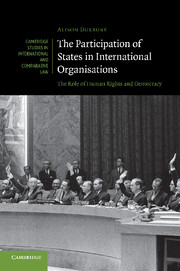Book contents
- Frontmatter
- Contents
- Foreword
- Acknowledgements
- Table of cases
- Table of treaties
- List of abbreviations
- Introduction
- 1 The move to institutions in the age of rights
- 2 The challenge of universality – the League of Nations and the United Nations
- 3 Rights, regionalism and participation in Europe
- 4 Restricting the ranks – excluding states from closed organisations
- 5 The relationship between powers, purposes and participation in specialised organisations
- 6 Legitimacy, democracy and membership
- Conclusion
- Select bibliography
- Index
- CAMBRIDGE STUDIES IN INTERNATIONAL AND COMPARATIVE LAW
- References
1 - The move to institutions in the age of rights
Published online by Cambridge University Press: 01 March 2011
- Frontmatter
- Contents
- Foreword
- Acknowledgements
- Table of cases
- Table of treaties
- List of abbreviations
- Introduction
- 1 The move to institutions in the age of rights
- 2 The challenge of universality – the League of Nations and the United Nations
- 3 Rights, regionalism and participation in Europe
- 4 Restricting the ranks – excluding states from closed organisations
- 5 The relationship between powers, purposes and participation in specialised organisations
- 6 Legitimacy, democracy and membership
- Conclusion
- Select bibliography
- Index
- CAMBRIDGE STUDIES IN INTERNATIONAL AND COMPARATIVE LAW
- References
Summary
Introduction
The second half of the twentieth century was marked by both a ‘move to institutions’ and the internationalisation of the idea of human rights. In a period in which the number and range of international organisations increased, there was a parallel rise in the breadth and depth of international human rights law. Klabbers has recognised that ‘it is no coincidence that historically the “move to institutions” coincided with the heyday of man's attempts to create an ever more perfect world’. Both the establishment of international organisations and the articulation of international human rights principles challenge the traditional notion of state sovereignty and the concept that states have an area of internal activity, or domestic jurisdiction, free from external influence and intervention. On the one hand these trends can be seen as an aspect of the declining power of the state, but on the other hand it is also recognised that the state system and the ability of states to freely enter into international obligations are an intrinsic part of the development of both international organisations and international human rights law.
This chapter deals with three related issues – the role of membership criteria in international institutional law, the application of the concept of legitimacy to international organisations, and the relationship between human rights, democracy and membership issues. Part II sets the scene for the study of the membership criteria and practice of the organisations selected for consideration by locating the place of membership criteria in international institutional law.
- Type
- Chapter
- Information
- The Participation of States in International OrganisationsThe Role of Human Rights and Democracy, pp. 13 - 59Publisher: Cambridge University PressPrint publication year: 2011



